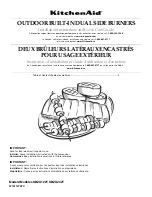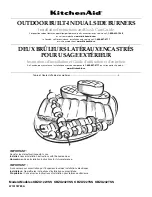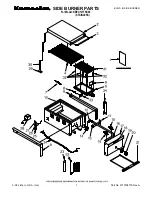
11 / 24
0006081484_201104
EN
GL
IS
H
MODULATION OPERATION DESCRIPTION
When the burner is ignited at the minimum setting, if the modula-
tion probe allows it (adjusted to a temperature or pressure which is
greater than that present in the boiler) the air adjustment servomo-
tor begins to turn causing a gradual increase in the flow of air and
consequently gas, up to the maximum flow to which the burner is set.
The increase in ventilator air pressure is detected by the proportional
gas valve sensor, which gradually adjusts the gas flow to the air
pressure variation, which is also gradual. The burner remains in
the maximum flow position until the temperature or pressure is high
enough to trip the modulation probe, which reverses the rotation of
the air adjustment servomotor.
Reverse rotation of the servomotor, and consequently a reduction
in gas and air flow, is effected in a series of short steps. By this
method, the modulation system operates towards bringing into
line the amount of heat supplied to the boiler and the heat that the
boiler puts out to service. The modulation probe fitted to the boiler
measures any request variations and automatically adjusts the fuel
and combustion air supply, by cutting the modulation servomotor
and increasing or reducing rotation.
During operation, the rotation speed V of the fan motor is driven
by the inverter according to the air shutter position. The rotation
speed V assumes an intermediate level between V1 (rotation speed
corresponding to the minimum opening) and V2 (rotation speed
corresponding to the maximum opening) and adjust linearly ac-
cording to the rotation angle of the servomotor. SeIf the limit value
(temperature or pressure) at which the stop device is set (thermostat
or pressure switch) is reached even with gas supply at minimum
level, the burner is shut down by the device.
When temperature or pressure returns below the shut-down device
tripping value, the burner is activated once again according to the
program described in the previous section.
ADJUSTING AIR ON THE COMBUSTION
HEAD
The combustion head has an adjustment device that allows
the air passage between the disk and the combustion head to
be opened or closed. You are thus able to obtain, closing the
passage, high pressure upstream of the disk even at low capacity.
The high speed and turbulence of the air allows greater penetration
into the fuel and therefore excellent mixture and flame stability.
High air pressure upstream of the disk may be necessary to
prevent flame fluctuations, this is particularly essential when the
burner works on the combustion chamber that is pressurized and/
or at a high thermal load.
It’s evident from the above, that the device which closes the air
on the combustion head should be put in such a position as to
always obtain a decidedly high air pressure value behind the disk.
It is advisable to adjust it in such a way as to obtain a closure of the
air at the combustion head that will require a significant opening
of the air shutter that regulates the aspiration flow from the burner
fan. This must of course be the case when the burner is working at
the maximum desired supply.
In practice you have to start the adjustment with the device that
closes the air at the combustion head in an intermediate position,
switching on the burner for approximate adjustment as explained
previously.
When the maximum desired supply has been reached, the
position of the device that closes the air at the combustion head is
corrected, moving it forward and backwards, until the right amount
of air is flowing to the supply, with the air shutter opened slightly.
!
The above adjustments are indicative
only; position the combustion head
according to the characteristics of the
combustion chamber
X= Distance combustion head-disk; adjust the
distance X following the indications below:
a) loosen screw 1
b) turn screw 2 to position the combustion
head 3, referring to index 4.
c) adjust the distance X between the
minimum and maximum according to the
indications in the table.
BURNER
X
Value
indicated by
index 4
TBG 45 PN-V
3 ÷ 31
0 ÷ 3,2
TBG 60 PN-V
6 ÷ 34
0 ÷ 3,2
COMBUSTION HEAD ADJUSTMENT DIAGRAM
FIG. 1
Содержание TBG 45 PN-V
Страница 2: ......
Страница 26: ...24 24 0006081484_201104 ENGLISH ...
Страница 50: ...24 26 0006081484_201104 ESPAÑOL ...
Страница 74: ...24 26 0006081484_201104 FRAÇAIS ...
Страница 98: ...24 24 0006081484_201104 TÜRKÇE ...
Страница 123: ...123 126 0006081484_201104 ...














































